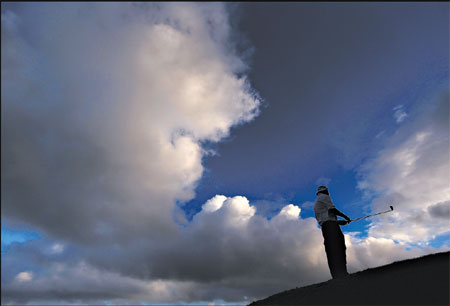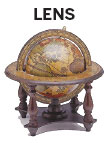Feeling anxious in a world of real dangers
 |
|
During a tournament, professional golfer Charlie Beljan suffered panic attacks that forced a hospital visit. He overcame his anxiety and won. Christian Petersen / Getty Images |
The young professional golfer Charlie Beljan should have been enjoying himself on the course in Florida last November as he stroked and putted his way to his first PGA victory. Instead, he spent the entire time thinking he was going to die.

Fear gripped him from one hole to the next: he was certain he was having a heart attack. His pulse raced, his heart pounded. After the first round, he left the course in an ambulance. Hospital tests showed he was fine. He was having a panic attack.
Beljan, 28, returned to the course and won the tournament, but throughout he struggled to remain standing. "I was crying on the range because I was so afraid these feelings would come back," he told The Times.
That reaction is understandable: In a world where danger does truly lurk (climate change, flu epidemics) and tragedy does strike (accidents, war, mass shootings), the runaway fear of a panic attack - a neurochemical event that causes a flight response without immediate cause - is especially disorienting. But it's not uncommon. Some 40 million American adults experience some form of anxiety, making it the most prevalent mental health condition in the United States.
Fear of dangerous situations (an earthquake tremor, a poisonous snake at your feet) is normal and thought to be an evolutionary trait that is part of our survival skills. Anxiety occurs when any fear - rational or irrational - interferes with daily life.
|
 |
But Beljan might be considered a novice. A real master of worrying, like the film director and screenwriter Woody Allen, embraces his fear - in his case, hypochondria - and uses it for laughs. "When I panic over symptoms that require no more than an aspirin or a little calamine lotion, what is it I'm really frightened of? My best guess is dying," he wrote in The Times. "I have always had an animal fear of death, a fate I rank second only to having to sit through a rock concert."
Widespread anxiety leads the list of mental disorders in nearly every developed nation. Still, some feel that the American way of life, with its worship of the "pursuit of happiness," is a national recipe for worry. In "America, happiness is work. Intense, nail-biting work, slogged out in motivational seminars and therapy sessions, meditation retreats and airport bookstores," Ruth Whippman, a Briton, wrote in The Times. "For the left there's yoga, for the right, there's Jesus. For no one is there respite."
Anxiety can have a national character, not free-floating, but historical. Traumatic events like wars, natural disasters and collapsing economies - like those of Greece and Spain now threatening the stability of Europe - can infect a national psyche.
In places where the long shadow of the Holocaust lingers and where rogue violence from far right factions still threatens many ethnic groups, anxiety can be both phantasmic and very real. The Hungarian novelist Laszlo Krasznahorkai wrote of the sense of always waiting for a knock at his door from a visitor who is violence personified: "He's not to be located either here or there, because, strange as it sounds, there is no single point on earth he could claim to be his home - he is pretty well everywhere. Of course there's no name, no past, nothing, just muscle pumped up with hatred."
As for Beljan, the public nature of his panic attack brought him notoriety as a talented, likeable representative for people with anxiety disorders, who often feel intensely isolated. His winning tournament also brought him an $846,000 paycheck and, perhaps briefly, some peace of mind.
Peter Catapano
The New York Times
















